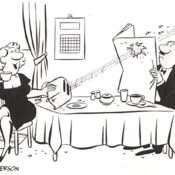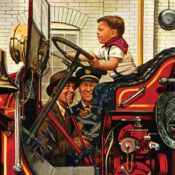Weeks ago, when everyone in my office started working remotely, we began sharing funny memes to keep in touch.
The thinking was that, as lockdown orders swept the nation and anxieties mounted, if a colleague still had the presence of mind to send an amusing, work-appropriate meme, they could probably be trusted with other things.
If, on the other hand, someone “went dark” and texted nothing to the group, or sent a blurry photo of a crying face, or a series of beer emojis, or the phrase “I can’t even,” it was a sign to subtly direct the workflow elsewhere.
Swapping visual jokes about shared experiences – toilet paper shortages, Zoom meetings, children cooped up at home all day – has been good for group morale when we’re miles apart. But a decade ago, few of us would have known what a meme was.
Richard Dawkins, an evolutionary biologist, coined the word “meme” in his 1976 book The Selfish Gene. Just as a gene transmits genetic information, a meme transmits cultural information. Examples of memes were “tunes, ideas, or catch-phrases” that “[leapt] from brain to brain,” wrote Dawkins. A decade later, writer Eloise L. Kinney described memes as “simply put, ideas that catch on.”
In 2020, when people say “meme,” they usually mean a joke, fad, or image that’s circulating on the Internet. According to a source in my household, today’s fifth graders traffic heavily in memes, sharing cat jokes on social media and learning dance moves from TikTok videos.
“The dance that’s trending all over America,” my 11-year-old daughter informed me, “is called The Renegade, where you just fling your arms around meaninglessly.”
That’s a meme.
Now that the nation’s office workers are stuck at home, many of us have seized on memes as a popular art form. Years from now, novels will be written, movies filmed, and music composed about this period in history, but no one can wait for these thoughtful, intricate forms of expression. We need to see our bizarre predicament mirrored back to us, right now, in the form of a doctored photo of Julie Andrews’ Maria from “The Sound of Music” being dragged away from the Bavarian Alps by police officers, with the tagline: “The Hills are closed.”
Indeed, they are. The clever mash-up of a classic reference and a current problem is what makes some memes so appealing. They’re free to all and have a universal feel. In our celebrity-obsessed culture, meme-makers ply their craft in anonymity: Everything that made me laugh today was conceived and executed by some faceless nerd, playing a dangerous game with the law of copyright.
During the last several weeks, we’ve seen “Brady Bunch” memes and memes of Jack Nicholson in “The Shining,” dressed in a bathrobe and leering insanely with a drink in his hand. (The joke was that his character, Jack, seemed to be coping pretty well with isolation.)
We’ve shared memes of dogs hiding after the umpteenth daily walk, and obese cats sprawled on the couch, embodying our “weekend plans.”
There have been “Star Wars” memes (Obi-Wan attempting to remote-teach Luke Skywalker about The Force), and memes based on old sitcoms like “The Office” and “The Golden Girls.”
Then there are random, semi-disturbing images, like the meme I found of a goose with human arms, gesticulating wildly. The tagline quoted the 1985 Aretha Franklin radio hit: “Who’s Zoomin’ Who?”
“Do you do any actual work?” asked my husband at some point.
“Yes! We get a lot done. These funny memes are helping us stay motivated!”
He shrugged and shuffled back to the bedroom where his work laptop was, along with the pretzels, chips, and salsa he now ate in there. We had relaxed the household rules, everyone coping in their own ways. My new shutdown habits were sending memes and taking naps, which suddenly seemed like a pleasant way to live. Why hadn’t we been doing these things all along?
Of course, most things about the national situation weren’t funny. Like everyone else, we were concerned for the sick and elderly, people whose jobs put them at risk, and the millions now out of work. We were helpless to solve these big problems, however, and succumbing to worry and depression would help exactly no one. So it seemed okay – even necessary, perhaps – to find things funny. If America lost its creative, irreverent sense of humor, the terrorist had won.
Hence, The Atlantic’s recent essay: “Yes, Make Coronavirus Jokes.” Writer Tom McTague observed that “as the world hunkers down, . . . there’s been a mass outpouring of gags, memes, funny videos, and general silliness. We might be scared, but we seem determined to carry on laughing.” Shared humor creates feelings of bondedness, acceptance, and community, McTague reported. “If we’re all finding this experience of being forced to stay home funny, it’s reassuring, a form of collective therapy.”
Similarly, Esquire published an essay earlier this month called: “Coronavirus Memes Brought My Dad and I Closer Together.” Sheltering in place far from his aging parents, writer James Stout praised silly memes (like “high-quality clips of people falling over”) for connecting him and his father in laughter on a daily basis. “Maybe it’s a bit of a stretch to think that dogs driving lawnmowers will bring us all together after this is over, but it is genuinely heartwarming to see the internet being used to spread joy,” he wrote.
Now if you’ll excuse me, I’m off to Google “cutting own hair bad idea memes 2020.”
Featured image: Shutterstock
Become a Saturday Evening Post member and enjoy unlimited access. Subscribe now



